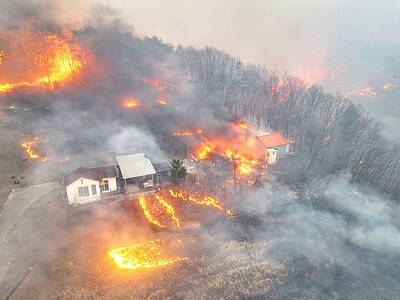Military officials view December as the optimal month for a US and Iraqi government offensive to reclaim the rebel enclave of Fallujah ahead of January national elections.
December is when Iraqi forces will come on line ready to participate in a full-fledged operation to take out Fallujah, considered the planning center for many of the spectacular car bombings that have plagued the country.
A security plan, drafted by the new Iraqi government and the top US General in Iraq, George Casey, calls for combined US and Iraqi security forces to claim back cities like Fallujah, Ramadi and Samarra that have swung out of their control.
The deadline is the January elections -- Iraq's first free polls in five decades -- which are in jeopardy amid the wave of bombings and assassinations. UN Secretary General Kofi Annan has raised skepticism about the date.
"Fallujah will be tough and we've got to make a decision when the cancer of Fallujah needs to be cut out ... We would like to end December at local control across the country," one senior officer told reporters.
The deputy for training Iraqi security forces, Brigadier Nigel Aylwin-Foster, told reporters that Iraqi forces still needed to gain more experience but that chances for victory would be high in December.
"It really depends on what level of risk the [Iraqi] leadership is prepared to take," Aylwin-Foster said.
"There will be a lot more security forces available by December. There will still be a level of risk, but there will be less risk than there is now because there will be more security forces."
But Aylwin-Foster stressed he did not know what the US and Iraqi leadership would decide was a proper number of Iraqi forces for an attack on Fallujah. Still, in December, roughly 7,200 men from nine elite intervention force battalions will be on line, with three of the units able to operate independently.
The intervention force has been designed specifically for fighting inside Iraq and is a by-product of April's failed US assault on Fallujah that saw Iraqi soldiers and national guard desert, unprepared to fight their countrymen.
The number of regular army battalions will have more than doubled to roughly 13,000 soldiers by December, with nine out of 16 battalions rated capable of independent action and trained for guerrilla warfare.
The interior ministry will also have a "civil intervention force," made up of police, ready in December to join any major fight, Aylwin-Foster added.
More than 40,000 national guardsmen would also be deployable for an offensive on rebel hotbeds.
The chairman of US joint chiefs of staff, General Richard Myers, stressed on Sept. 7 a campaign to reclaim Fallujah would need an Iraqi face and said Iraqi forces would not be ready until December.
"By December, we're going to have a substantial number of Iraqi security forces equipped, trained and led to conduct the kind of operations I was talking about,"

A French-Algerian man went on trial in France on Monday for burning to death his wife in 2021, a case that shocked the public and sparked heavy criticism of police for failing to take adequate measures to protect her. Mounir Boutaa, now 48, stalked his Algerian-born wife Chahinez Daoud following their separation, and even bought a van he parked outside her house near Bordeaux in southwestern France, which he used to watch her without being detected. On May 4, 2021, he attacked her in the street, shot her in both legs, poured gasoline on her and set her on fire. A neighbor hearing

DEATH CONSTANTLY LOOMING: Decades of detention took a major toll on Iwao Hakamada’s mental health, his lawyers describing him as ‘living in a world of fantasy’ A Japanese man wrongly convicted of murder who was the world’s longest-serving death row inmate has been awarded US$1.44 million in compensation, an official said yesterday. The payout represents ¥12,500 (US$83) for each day of the more than four decades that Iwao Hakamada spent in detention, most of it on death row when each day could have been his last. It is a record for compensation of this kind, Japanese media said. The former boxer, now 89, was exonerated last year of a 1966 quadruple murder after a tireless campaign by his sister and others. The case sparked scrutiny of the justice system in

DITCH TACTICS: Kenyan officers were on their way to rescue Haitian police stuck in a ditch suspected to have been deliberately dug by Haitian gang members A Kenyan policeman deployed in Haiti has gone missing after violent gangs attacked a group of officers on a rescue mission, a UN-backed multinational security mission said in a statement yesterday. The Kenyan officers on Tuesday were on their way to rescue Haitian police stuck in a ditch “suspected to have been deliberately dug by gangs,” the statement said, adding that “specialized teams have been deployed” to search for the missing officer. Local media outlets in Haiti reported that the officer had been killed and videos of a lifeless man clothed in Kenyan uniform were shared on social media. Gang violence has left

‘HUMAN NEGLIGENCE’: The fire is believed to have been caused by someone who was visiting an ancestral grave and accidentally started the blaze, the acting president said Deadly wildfires in South Korea worsened overnight, officials said yesterday, as dry, windy weather hampered efforts to contain one of the nation’s worst-ever fire outbreaks. More than a dozen different blazes broke out over the weekend, with Acting South Korean Interior and Safety Minister Ko Ki-dong reporting thousands of hectares burned and four people killed. “The wildfires have so far affected about 14,694 hectares, with damage continuing to grow,” Ko said. The extent of damage would make the fires collectively the third-largest in South Korea’s history. The largest was an April 2000 blaze that scorched 23,913 hectares across the east coast. More than 3,000